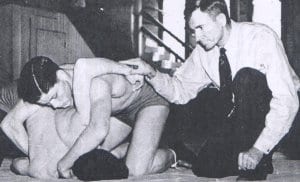
Ed Gallagher
I come from a family of coaches. My granddad, uncle and cousin all made or make their living coaching kids’ basketball, American football and track teams – and one distant relative was the legendary (in Oklahoma) wrestling coach Ed Gallagher (pictured).
The quality of their teams varied. Raw talent is a major factor. Fitness and skill, another. Even great coaches can’t do much with poorly conditioned, inexperienced players.
In the agency world, we’re generally blessed with good teams: professionals selected from a deep pool of qualified applicants who are trained in the specific ways we help clients. Many teams are pretty solid without much guidance from us bosses, to be honest.
But truly great teams – state championship-winning, record-setting, trophy-case filling squads – tend to have a few things in common: excellent leadership, committed motivation and a clear sense of purpose as a group and as individuals.
Not every team can win it all. But good teams, whether on the field or in the office, can be made much better by following these five coaching tips (as gleaned over the years reliving big games with my family of coaches):
1. Everyone knows the team goal and how the score is kept.
Sounds obvious, but it’s not always clear to all teams what we are trying to do, why we are trying to do it and how we’ll know we’ve succeeded. Every agency is different, but at Ketchum we look at “winning” in three ways: how engaged our people are, how loyal our clients are and how we are able to meet our financial commitments to our shareholders.
2. Everyone knows their job/role on every single play.
This is often the hardest part of coaching. It takes time, repetition and patience to help every member of the team know exactly what they are expected to do, and how it fits into the larger goal. Our best teams meet often – daily in many cases – to literally review the immediate game plan, spell out assignments and make corrections to performance.
3. The best players are given room to maneuver.
Every team has a few stars – and great coaches know who they can count on. The best teams have great players who are given some leeway – or a lot, in some cases – to alter the game plan, take a shot or change the tempo. Micromanagement kills great teams (click to tweet).
4. Solid players are celebrated.
The difference between a safe pair of hands and a superstar is sometimes no more than a matter of confidence. Great coaches know that the balance of any given game rests more on a slightly better performance from an average player than the heroism of the best, and they constantly nurture self-belief through positive feedback and constructive improvements.
5. Weaker players are developed – or shown the door.
This sounds harsh, but there is no room on a great team for a player that doesn’t want to be there. Some simply lack the skills or understanding of the game; they can be coached and improved. Others, however, have the wrong attitude; they don’t buy into the overall goals, or they won’t support the rest of the team. They gotta go.
And try as I might, I couldn’t find a way to work in one of my all-time favorite coaching mantras: clear eyes, full hearts, can’t lose.


